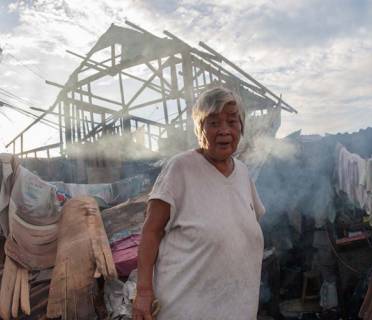 The drive from Cebu City to Bogo takes longer than we expect, four hours instead of the usual two.
The drive from Cebu City to Bogo takes longer than we expect, four hours instead of the usual two.
For the first three hours, the journey is pleasant, and we get a glimpse of ordinary everyday life in the Philippines; children wandering to school, teenagers playing volleyball, stall vendors selling Christmas decorations.
Then we cross the mountains and we see how geographically lucky those people were. On the other side devastation slowly creeps up on us. We start our conversations with: “Oh, well this isn’t too bad.”
Norie, our colleague from our partner organisation COSE remains silent – she’s already been to Bogo, doing assessments over the last few days with older people’s associations. Over the next hour, our comments change to simply: “Oh…”
People on the move
It is bad. The only buildings completely intact are churches and those of the local landowners. By the time we get to Bogo, the town is buzzing. Word is out that government distributions of rice and water are taking place and everyone is on the move. The only people left behind to look after what remains of their homes are older people and young children. I see older woman burn rubbish in order to make a fire to boil water for the long-awaited rice.
Darkness falls incredibly quickly and we are forced to return to Cebu. The roads are now even busier than before with large trucks coming from Cebu. We hope the trucks are carrying food and supplies.
In the dark, hundreds of children line the busy main road holding signs pleading for food and money, and goading each other to stand closer and closer to the edge. The adults are sitting by the roadside too. They have realised that the only aid on this road so far has been by private individuals coming by car and if there is any chance of them being in the right place at the right time they will sit there no matter how long that takes.
Older people reluctant or unable to leave their homes
Behind them we see windows of their damaged houses are glowing with single candle or kerosene lamps. Most houses are only partly roofed if at all but some shelter can be found there if it’s not raining. People seem inclined to stay near their houses, possibly afraid that any remaining possessions may be taken, or maybe just wanting to be at home.
Many older people last week were reluctant – or maybe unable – to leave their homes despite warnings from the government and from organisations like COSE, who sent text messages to members of their older people’s associations. In the end many had to be rescued by emergency services. Many others died in their homes.
On our return trip tomorrow we plan to see the older people who were evacuated in time at one of the 1,000 evacuation centres that now exist.
Donate now
In the UK
Our sister organisation, Age International, has launched an emergency appeal to support older people affected by Typhoon Haiyan.
Or you can text URGENT to 70004 to donate £5 to help older people in the Philippines.
In the USA
Our sister organisation, HelpAge USA, has launched an emergency appeal to support older people affected by Typhoon Haiyan.
Elsewhere
If you live outside the UK and the USA you can donate to support older people by Typhoon Haiyan here.
